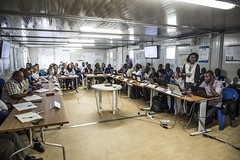Nestle's YOUth 10th anniversary impact report
This is a report about the Nestlé Needs YOUth Initiative. It discusses the initiative's goals and achievements over ten years. The initiative was launched to improve young people's employment prospects. It has since expanded to include entrepreneurship and agripreneurship programs. Nestlé Needs YOUth has provided thousands of work opportunities and training sessions. The program emphasizes mentorship and aims to empower young people.



